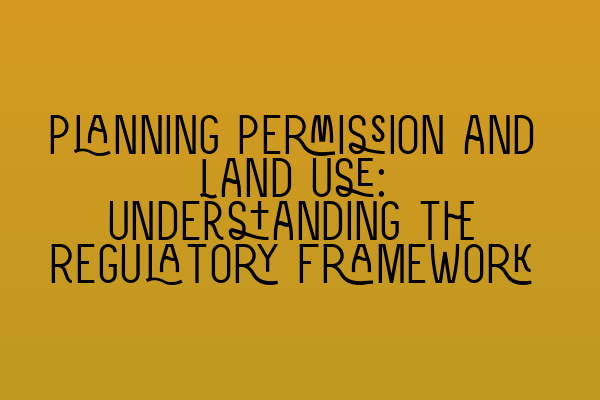Planning Permission and Land Use: Understanding the Regulatory Framework
When it comes to property development and land use, one of the most critical factors to consider is planning permission. Obtaining planning permission is a crucial step for any individual or organization looking to develop land or change the use of existing structures. As a solicitor specializing in property law, I often find that many individuals and businesses have several misconceptions or a lack of understanding about the regulatory framework surrounding planning permission. In this blog post, we will explore the basics of planning permission and the complex regulatory framework that governs it.
1. What is Planning Permission?
Planning permission is a legal requirement for certain types of development or changes in land use. It is essentially the approval granted by the local planning authority to build new structures, modify existing ones, change the use of land or buildings, or carry out any other development activities. Without obtaining planning permission, any development work carried out may result in enforcement action, fines, or even demolition.
2. The Planning Process
The planning process usually involves submitting an application to the local planning authority detailing the proposed development or change in land use. The application must include various documents, such as plans, drawings, and supporting statements, to demonstrate that the proposed development complies with the relevant planning policies and guidelines. The local planning authority will then assess the application based on these policies, as well as considering factors such as environmental impact, community impact, and infrastructure capacity.
Once the local planning authority has received the application, they will often seek input from various stakeholders, such as the Highways Agency, environmental agencies, and the local community. This allows for a comprehensive assessment of the proposal’s impact on the surrounding environment and community.
It’s important to note that the planning process can be lengthy and complex, with applications ranging from small-scale residential extensions to large-scale commercial developments. Therefore, it is advisable to seek professional advice and guidance from a solicitor experienced in property law to navigate this process.
3. Relevant Legislation and Policies
The regulatory framework surrounding planning permission is primarily governed by national legislation, such as the Town and Country Planning Act 1990, as well as numerous regulations and policy documents. These policies and regulations help to guide local planning authorities in their decision-making process and ensure that development is carried out in a sustainable and controlled manner.
Local planning authorities also develop their own local plans, known as Local Development Frameworks or Local Plans. These plans set out the long-term vision for development in the area and include specific policies and guidelines tailored to the local context. It is crucial for anyone considering development or land use changes to review the local plan and understand how it may affect their proposal.
4. Permitted Development Rights
In certain circumstances, developments may be allowed without the need for a specific planning permission application. These are known as permitted development rights. Permitted development rights are granted by law and provide a level of flexibility for small-scale developments that are unlikely to have a significant impact on the surrounding area.
It is important to note that permitted development rights vary depending on the type of development and the specific location. It is always advisable to check with the local planning authority or consult with a solicitor to confirm whether your proposed development falls within permitted development rights.
5. Conclusion
Understanding the regulatory framework surrounding planning permission is essential for anyone involved in property development or considering a change in land use. Navigating the planning process and ensuring compliance with relevant legislation and policies is crucial to avoid complications, fines, or even legal action.
If you require assistance with your planning permission application or any other property-related legal matters, our team at SQE Property Law & Land Law is here to help. Contact us today to speak to one of our specialist solicitors.
Related Articles:
– Interactive SQE Mock Tests for Contract Law: Test Your Knowledge
– Parties in a Contract: Rights and Responsibilities
– The Importance of Ethics in Contract Law: A Comprehensive Guide
– Unveiling Duress and Undue Influence in Contracts
– Essentials of Consideration: Understanding the Backbone of Contracts
